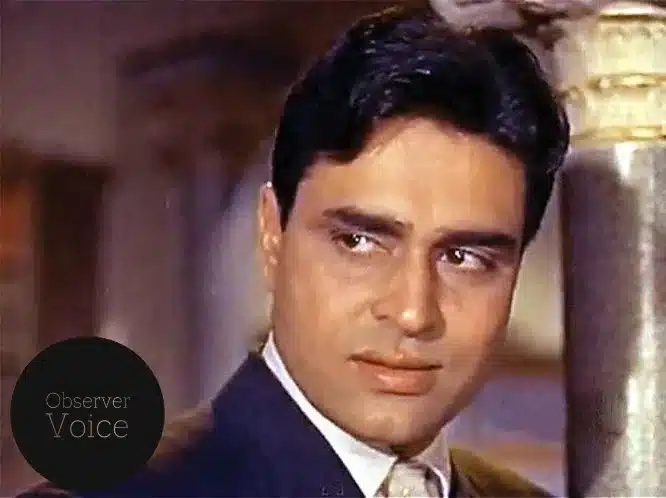The Life and Legacy of Rajendra Kumar

Rajendra Kumar (20 July 1929 – 12 July 1999) an Indian Film Actor, Film Producer, Film Director & Editor who was well-known for his work in Bollywood. He appeared in over 80 movies during a career that spanned over four decades.
Early Life And Education
Rajendra Kumar, an iconic figure in Bollywood, was born as Rajendra Kumar Tuli on July 20, 1927, in Sialkot, Punjab, which was then part of British India and is now in Pakistan. He hailed from a Punjabi Hindu Khatri family; his grandfather was a successful military contractor, and his father ran a textile business in Karachi. The partition of India in 1947 had a profound impact on his life, disrupting his education at the Hailey College of Commerce in Lahore and forcing his family to relocate to India. Despite these challenges, Rajendra Kumar’s determination led him to the Hindi film industry, where he began his career and eventually rose to stardom. His early experiences, marked by both privilege and upheaval, shaped his resilient character and contributed to his illustrious career in cinema.
Career And Achievements
Rajendra Kumar, an iconic figure in Bollywood, began his career in 1949 and quickly rose to prominence with his role in the film “Vachan” in 1955. His performance in the epic drama “Mother India” in 1957 catapulted him to stardom, earning the film an All Time Blockbuster status and a National Film Award for Best Feature Film in Hindi. Known as “Jubilee Kumar” for his string of successful films in the 1960s, he delivered hits like “Goonj Uthi Shehnai” and “Dhool Ka Phool,” with the latter’s song “Tu Hindu Banega Na Musalman Banega” becoming a timeless hit. His role in the courtroom drama “Kanoon” in 1960 won him a National Film Award and the prestigious Justice of Peace honor, reflecting his impact on Hindi cinema.
In 1970, the Government of India recognized his contributions to the arts with the Padma Shri award, one of the nation’s highest civilian honors. His performances in “Dil Ek Mandir,” “Ayee Milan Ki Bela,” and “Aarzoo” earned him Filmfare Awards, cementing his status as a leading actor of his time. Beyond his cinematic achievements, Rajendra Kumar was known for his philanthropy and was associated with several charity schemes, showcasing his dedication to giving back to society. His legacy in Indian cinema is marked by a blend of critical acclaim and commercial success, with his films continuing to be celebrated for their cultural impact and his performances remembered for their depth and emotion.
Notable Events And Milestones
Rajendra Kumar journey from a family of affluence to a life marked by the Partition’s trials is a testament to his resilience. His early career was shaped by his work as an assistant to director H.S. Rawail, which laid the foundation for his acting pursuits. Kumar’s rise to prominence began with the film ‘Vachan’ in 1955, followed by the epic drama ‘Mother India’ in 1957, which became a cinematic landmark and a box office triumph, earning a place in the book ‘1001 Movies You Must See Before You Die’. The late 1950s and early 1960s saw Kumar’s ascent to stardom with hits like ‘Goonj Uthi Shehnai’ and ‘Dhool Ka Phool’, earning him the affectionate moniker ‘Jubilee Kumar’ for his string of successful films.
Kumar’s legacy is not just limited to his filmography but also includes his contributions to the industry’s newcomers, offering support and opportunities to actors like Dharmendra and Feroze Khan. His generosity extended beyond mentorship, as he produced significant films that gave early breaks to future stars like Rajesh Khanna and Randhir Kapoor. Despite facing challenges in the 1970s, Kumar’s impact remained, evidenced by his ability to draw audiences with his performances in Punjabi cinema and his continued presence in Hindi films. Rajendra Kumar’s influence on Indian society and culture extends beyond his film roles. He was a symbol of perseverance and adaptability, embodying the post-Partition spirit of starting anew and achieving success against all odds. His films often dealt with social themes that resonated with the masses, contributing to a cultural dialogue on issues pertinent to the era. His portrayal of characters grappling with moral and ethical dilemmas mirrored the complexities of real life, making him a relatable figure to a wide audience.
In recognition of his significant contributions, the Government of India honored Rajendra Kumar with the Padma Shri Award in 1970, cementing his status as a distinguished artist. His death on July 12, 1999, marked the end of an era, but his legacy continues to inspire and influence the Indian film industry and its audiences.
Awards And Honors
- Padma Shri (1970).
- Justice of Peace honour and served as Honorary Magistrate.
- National Honour by late Pt. Jawaharlal Nehru for Kanoon (Hindi) and Mehndi Rang Lagyo (Gujarati film).
- Special Lal Bahadur Shastri National Award.
- Associated with several charity schemes.
Additional Resources
- “Jubilee Kumar: The Life and Times of a Superstar” by Seema Sonik Alimchand is a biography that offers an inside look at the life of Rajendra Kumar.
- The Wikipedia page on Rajendra Kumar provides a comprehensive overview of his life, career, and contributions to Indian cinema.
- For a more personal insight, interviews with family members and colleagues can be found in various archives and might be available upon request at film history museums in India.
- Documentaries featuring the era of Indian cinema in which Rajendra Kumar was active may also provide context and information about his impact on the industry.
- Visiting the Film and Television Institute of India in Pune, which houses a collection of Indian cinema history, could be beneficial for those interested in Rajendra Kumar’s work and legacy.
Observer Voice is the one stop site for National, International news, Sports, Editor’s Choice, Art/culture contents, Quotes and much more. We also cover historical contents. Historical contents includes World History, Indian History, and what happened today. The website also covers Entertainment across the India and World.

